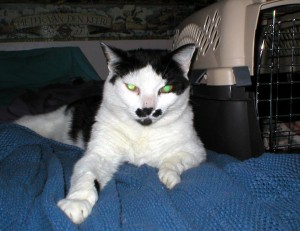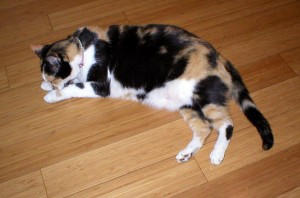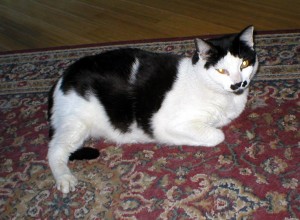
Little does Groucho know that he is about to be stuffed into the cat carrier and taken to the v-e-t.*
*Nothing serious, just his yearly checkup.

Little does Groucho know that he is about to be stuffed into the cat carrier and taken to the v-e-t.*
*Nothing serious, just his yearly checkup.
![]()
![]()
![]()
![]()
![]()
anehē
describes someone who generally tells the truth; honest, truthful.
![]()
![]()
![]()
![]()
![]()
![]()
![]()
anpēsse
easily distracted, flighty, scatterbrained.
![]()
![]()
![]()
![]()
![]()
![]()
ankēnnā
As an attribute, this means questioning, curious, interested, wondering, not necessarily about something specific. As an abstraction, this refers to curiosity and interest.
la sāen makēnnā;
“She is curious.”
ankēnnā can also refer to something experienced:
sema jakēnnā to jasēlki jatūi;
She is curious about flying machines.
The form becomes jakēnnā because it is the object of SE and so specifies a particular curiosity. This is something I have difficulty explaining. The stative form refers to an abstract concept. But one doesn’t experience an abstract concept, one experiences a feeling or some other specific thing. So, one cannot say sema ankēnnā where we would say that someone experiences curiosity, one has to make it specific and so one says sema jakēnnā.
![]()
![]()
![]()
![]()
![]()
![]()
![]()
![]()
![]()
anwasōnen
The opposite of ansōnen; so, not clever, not wise, not knowing more than others, makes bad decisions.
![]()
![]()
![]()
![]()
![]()
![]()
![]()
ansōnen
clever, wise, knowing more than others, makes good decisions. This differs from antēlen in that ansōnen is not based on one’s education, but rather on some “inborn”* ability to figure stuff out on one’s own.
*whether this is actually inborn is subject to debate.
![]()
![]()
![]()
![]()
![]()
![]()
![]()
antēlen
wise, knowledgeable, educated; describes someone who knows something because they learned about it or know about it.
![]()
![]()
![]()
![]()
![]()
![]()
![]()
![]()
![]()
![]()
anpālloλīwe
The opposite of anpālloλa, so unwilling to believe what another says is true, skeptical.
Two pictures today:


I’m not sure if Groucho is trying to trip someone or not.
![]()
![]()
![]()
![]()
![]()
![]()
![]()
![]()
anpālloλa
credulous, having a tendency to believe what others say is true, which, of course, shades into gullible.